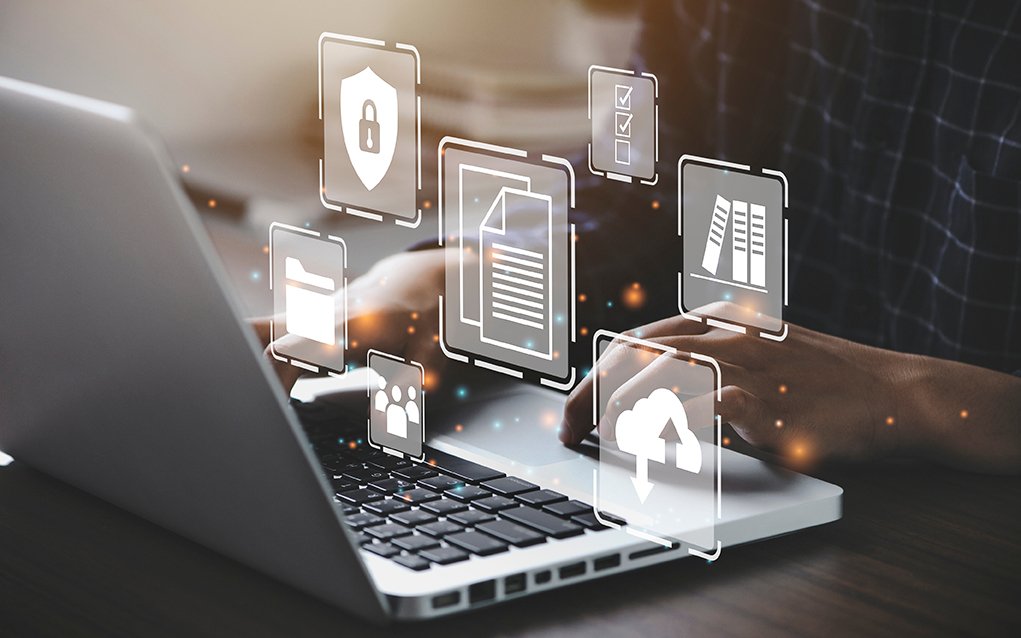- Life In The Cloud, An Introduction
- Digital Literacy And Life In The Cloud
Digital literacy and life in the cloud refer to the ability to use, understand, and navigate digital technologies effectively and responsibly. To emphasize, it encompasses a range of skills and competencies that empower individuals to engage with digital devices, software applications, and online platforms. In short, it enables us to access, create, and communicate information proficiently. Digital literacy is increasingly important in today’s technology-driven world and plays a significant role in education, work, and daily life.
In part one of the introduction to the series Life In The Cloud, we introduce ways we are using cloud technologies. In this second part of the introduction, we are focusing on how unknowingly we have adapted to technologies such as cloud technology. Also, we have adjusted to life in the cloud without being familiar with what the term digital literacy means.
The Immersive Effect of Digital Literacy
The fact is, as you read this post, you will hopefully see how advancing technologies propel digital literacy. It’s everywhere, and almost everyone has some level of literacy. Let’s review some of these skills.
1. Basic Digital Skills
In brief, these are foundational skills necessary for using digital devices, such as computers, tablets, and smartphones. Just so you know, basic skills include turning devices on and off, using a keyboard and mouse or touchscreen, and understanding hardware components.
2. Internet Skills
When we say internet skills, we are referring to knowing how to access the internet. Taken a step further, it’s also the ability to use web browsers effectively. Further, navigating websites is crucial for digital literacy. This includes conducting online searches, bookmarking favorite websites, and understanding web addresses (URLs).
3. Information Literacy
Information literacy involves the ability to evaluate online information sources for accuracy, credibility, and relevance. It includes discerning between reliable and unreliable information and avoiding misinformation and fake news.
4. Communication Skills
The ability to communicate is, in fact, a major segment of digital literacy. This includes proficiency in using various communication tools and platforms, such as email, social media, instant messaging, and videoconferencing. This encompasses composing and sending messages, managing contacts, and understanding online etiquette.
5. Media Literacy
Media literacy involves understanding and analyzing various forms of digital media, including images, videos, and multimedia presentations. Further, this skill helps individuals interpret and critically evaluate media messages and content.
6. Problem-Solving Skills
Unquestionably, digital literacy fosters problem-solving abilities. To put it another way, when individuals encounter technical issues or errors in applications, software, and devices, it applies to knowing what to do to fix such issues. Without a doubt, troubleshooting and seeking help online are important aspects of this skill.
7. Productivity and Creativity
Similarly, being digitally literate includes proficiency in using productivity software, such as calendars, lists, word processing, and spreadsheet applications. Not to mention, creativity tools such as graphic design software, and video editing for personal and professional tasks.
8. Adaptability and Lifelong Learning
And finally, in a rapidly evolving digital landscape, digital literacy also involves the ability to adapt to new technologies, as well as learning continuously to stay current with digital advancements.
The Trustworthiness of Digital Life
Without a doubt, it impacts every part of our lives. While there are things in our lives that we wish to remain constant, technology isn’t one of those things we have power and sway. New tools and technologies unfold constantly. Another key point, it doesn’t take a decade or two for apparent change. Advancements happen year-to-year.
With the constant evolvement of technologies, one consequence on the forefront of the consumer mind is personal security. Security and awareness of personal information transference have grown exponentially. Two key factors that are of concern are:
1. Cybersecurity Awareness
Knowing how to protect personal information, recognize online threats (such as phishing scams and malware.) Also, the ability to use strong passwords is essential for online safety and security.
2. Digital Citizenship
Digital literacy also includes responsible and ethical online behavior. It emphasizes respecting the rights and privacy of others, practicing digital etiquette, and avoiding cyberbullying and online harassment.
3. Fake News
We mentioned “Fake News” above. It’s worth mentioning again because as our use of the internet grows, so have the threat of mis-information. Unfortunately, there are no constraints on putting information on the internet. It’s up to us to decipher and interpret information to determine if it’s correct or not.
Related: Fake Or Real? How To Self-Check The News And Get The Facts
The Importance of Digital Literacy
The effect and consequence aside, digital literacy is of paramount importance in today’s technology-driven world. It’s important because of its enveloping ability in our lives. We need to understand it and how to use it in order to not feel obsolete. Also, navigating digital tools and technologies effectively isn’t just because we are so enthralled by it. It’s also about staying relevant. On many levels, we choose to allow it to be a mainstay in our lives because of its applicability. Here are several specific reasons digital literacy is crucial.
1. Access to Information
Digital literacy empowers individuals to access vast amounts of information available on the internet. It enables them to search for knowledge, research topics, and stay informed of past and current events.
2. Communication
Digital literacy is essential for effective communication through email, social media, instant messaging, and videoconferencing. It allows people to connect with others locally and globally.
3. Education
Many educational institutions rely on digital platforms for coursework, assignments, and resources. Digital literacy is essential for students to succeed and employers to train their employees in these environments.
4. Workplace Skills
In the modern workplace, digital skills are in high demand. Proficiency with productivity software, data analysis tools, and collaboration platforms is often a requirement for various job responsibilities.
5. Career Opportunities
Digital literacy can open doors to a wide range of career opportunities, especially in technology-related fields. It allows individuals to adapt to changing job market demands, such as the ever-evolving hybrid work.
6. Critical Thinking
Digital literacy promotes critical thinking and discernment. It helps people evaluate the credibility of online sources and identify misinformation.
7. Problem Solving
Digital literacy includes troubleshooting skills, which are valuable when encountering technical issues with devices, applications or softwares. It fosters problem-solving abilities.
8. Financial Management
Online banking, budgeting apps, and digital payment systems are prevalent in today’s growing digital divide.. Digital literacy is essential for managing personal finances efficiently and securely.
9. Healthcare Access
Digital literacy is crucial for accessing telehealth services, scheduling appointments online, and managing health records through patient portals.
10. Citizenship and Civic Engagement
In this digital age, citizens engage with government and take part in civic activities online. Understanding digital platforms and how to engage responsibly is essential for informed citizenship.
11. Entrepreneurship
Digital literacy is a cornerstone for entrepreneurs and small business owners. It enables them to develop and market products or services online, manage finances digitally, and reach a global audience.
12. Personal Development
Access to online courses, e-books, and educational content empowers individuals to pursue personal and professional development goals effortlessly.
13. Innovation
Digital literacy fuels innovation. People who understand digital tools can develop new technologies, applications, and solutions to address societal challenges and needs.
14. Global Connectivity
In an interconnected world, digital literacy fosters global connectivity. It allows people to engage in cross-cultural and cross-global communication and collaborations.
15. Data Privacy and Security
Understanding digital literacy includes knowledge of online safety practices, protecting personal information, and recognizing online threats.
Summary
Digital literacy is a fundamental Skillset for individuals of all cultures, age and background. It not only enhances personal and professional opportunities, it also promotes informed and responsible participation in this ever-evolving digital society. As technology continues to unfold, staying digitally literate is essential for adapting to a continuously advancing digital landscape.
The progress of technology and digital literacy are not just connected, it shapes our personal and professional lives. To thrive in today’s technology-driven world, we must repeatedly develop digital literacy skills by adapting to and learning new technologies. We need to navigate our digital landscape effectively and make informed decisions effectively.
Stay tuned for the next installment in this series on life in the cloud.










